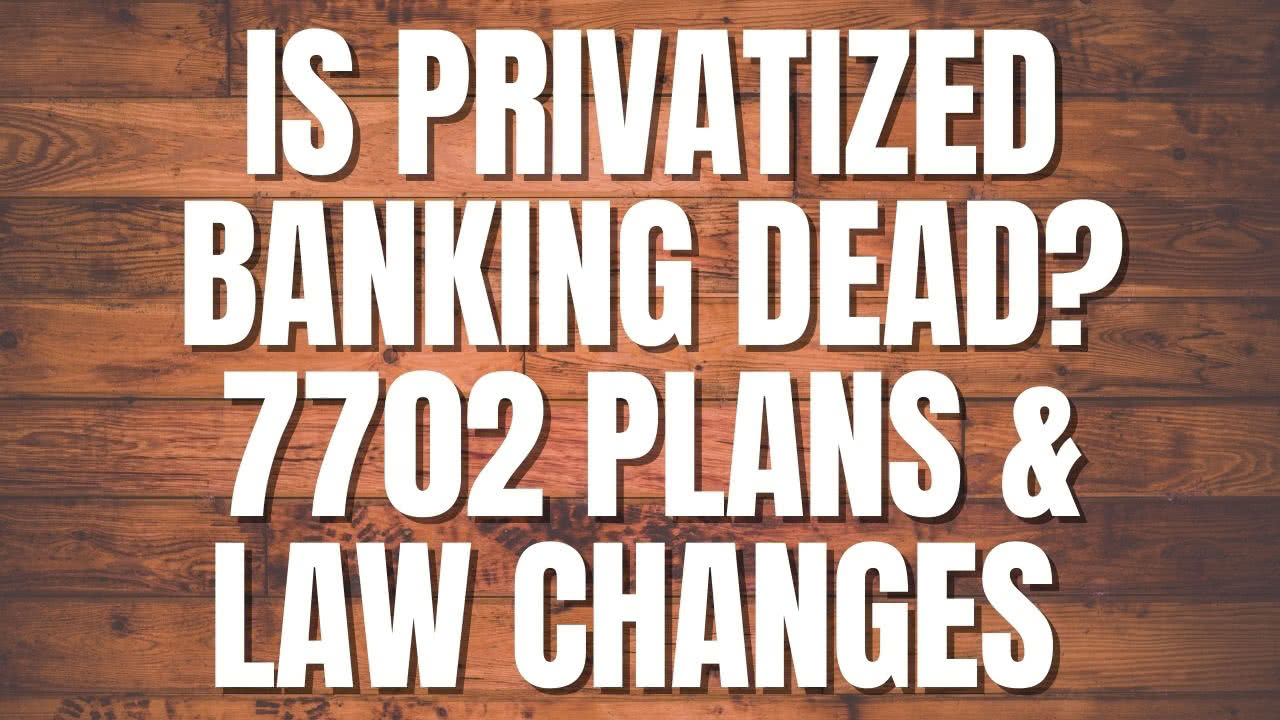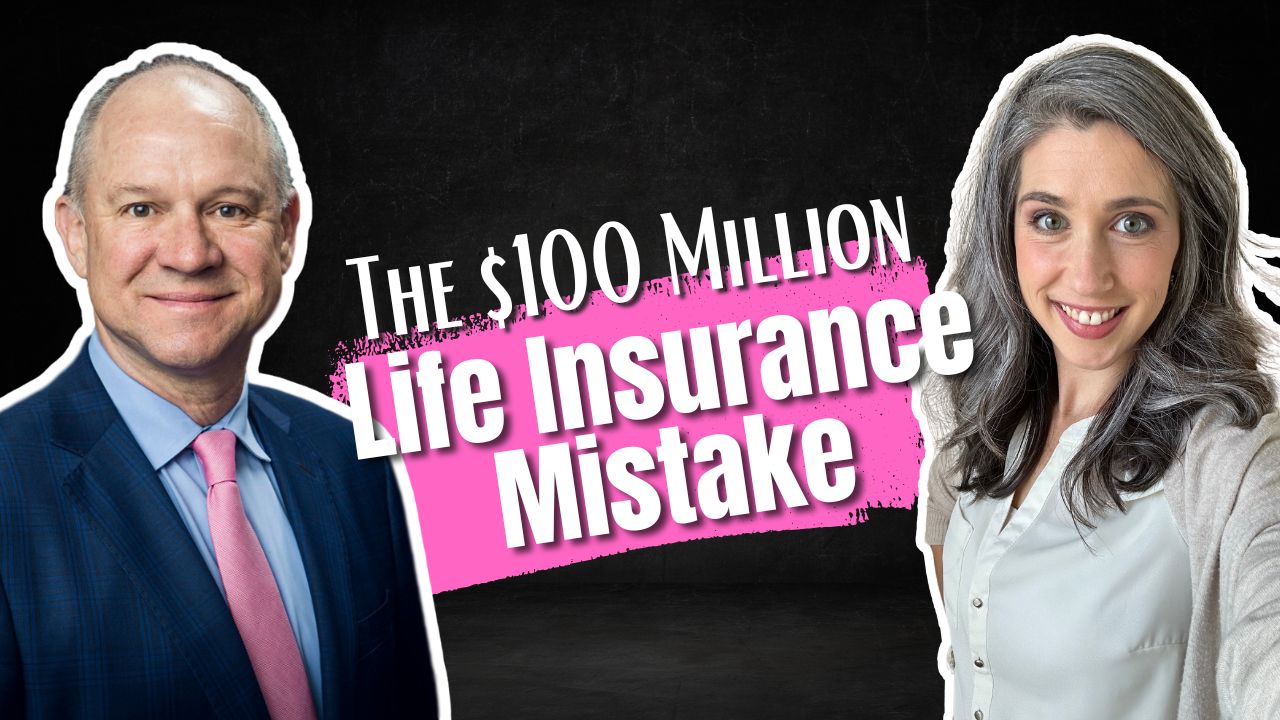
Is Infinite Banking Dead? 7702 Plan and Law Changes
Right now, you have a fantastic opportunity to use whole life insurance as a place to store cash, build capital reserves, get better than bank rates on savings, AND the ability to earn never-ending compound interest, even WHILE you’re using the same money for something else. And you don’t have to qualify to access your capital. You can thank the 7702 Plan for that.
But is this long-time financial bunker of the wealthy about to become an obsolete vintage classic?
The recent spending bill Trump signed into law went into effect on January 1, 2021. As a result, we’ll be seeing some critical changes to the IRS code that has made Privatized Banking such a powerful opportunity.
There’s still much to be determined, but today, we’re looking at tax code changes and how they affect you.
So if you want to find out what these changes mean for your ability to get the profound guarantees and wealth-building strategy of Privatized Banking… tune in below!
Podcast: Play in new window | Download (Duration: 57:06 — 65.3MB)
Subscribe: Apple Podcasts | Spotify | Android | Pandora | Youtube Music | RSS | More
Table of contents
What is the 7702 Rule?
In short, this is the part of the tax code that enables Privatized Banking strategies with life insurance. The way life insurance has been defined in the past, according to the Federal Government, offers many tax advantages.
- Tax-deferred growth, which can sometimes be experienced tax-free if used properly,
- Tax-free policy loans,
- And an income-tax free death benefit.
Because of these tax advantages, there is a provision that prevents whole life insurance from being abused. If too much premium is funneled in too quickly through Paid-Up Additions, a policy can become a modified endowment contract (MEC).
What is a MEC?
Up until the 80s, people were abusing the benefits of life insurance by purchasing a small face value, funneling in extra premium, and calling it life insurance. Then, they were reaping all the tax benefits.
In 1984, the government put a stop to that by placing limits on over-funded policies. While still possible to do, once a policy becomes a MEC, it no longer carries the same tax advantages.
The trick to Privatized Banking is to design policies with as much premium as possible, without a policy becoming a MEC. That way, you can get as much cash value as possible, while still reaping the benefits of tax advantages.
What’s Changing with 7702 Plans?
The bill, signed in December, went into effect in January. The 5,593 page document has taken time to wade through, but here’s what we now know. Regulations for what constituted a MEC are changing.
MEC Qualifications
Prior to this bill, a life insurance policy had to pass something called a 7-pay test to qualify. The test determines how quickly a policy could be considered “paid-up,” or fully funded. If your policy was paid-up within the first seven years of the policy, it would fail the test and become a MEC.
Now, the MEC test will be based on a floating rate relative to the Prime rate.
Changes in Guarantees
One of the greatest strengths of a life insurance policy is certainty: there are guarantees built into the policy that keep your money secure—and growing. Previously, the minimum guaranteed interest rate on policy growth was 4%, however the government lowered that rate to 2%. However, it’s important to note that insurance companies have been successfully navigating a low-interest rate environment for a long time. And just because the floor has lowered does not mean rates can’t be higher.
The Impact of the 7702 Plan Changes

While these changes will affect policies going forward, it’s important to note that any policies currently in-force will not change. Life insurance is contractual, and companies are required to uphold current contracts. New policies, both whole life and universal life, will be affected.
However, we see this as a positive change overall. Low bond yields overwhelmed insurance companies as they worked to meet their contractual obligations. This new minimum will allow insurance companies to continue to meet their guarantees in this low-interest-rate environment.
It’s important that life insurance companies maintain their longevity and integrity, and the returns were almost too good for how low bond yields were in 2020. We want mutual companies to succeed, because it allows our policies to succeed, too. Remember, mutual insurance companies share profits with policy owners—if yields go up, so do dividends. The lower guarantee threshold allows companies to stay afloat in leaner times.
7702 Plan Changes and MECS
One of the other powerful side effects of lower interest rates is that you can funnel in more premium dollars per death benefit without a policy becoming a MEC. In the long run, this can improve compounding, and in the early years of your policy makes more cash value available to you.
This happens because of the cost of insurance. Based on the face value of the death benefit, and actuarial tables, the insurance company carefully calculates the cost of insurance. Base premiums are based on this calculation, and in the early years of a policy most of your premium goes to paying the cost of insurance. Paid-up additions allow you to funnel money in beyond that amount, which means more of your premium will go into your cash value. These additions can improve the amount available to you in early years.
The downside is that your guaranteed cash values will be lower because of the lower guaranteed rate.
Did the 7702 Plan Change Destroy Privatized Banking?
Ultimately, we don’t think so. While adjustments will need to happen when designing new policies, we see this change as an opportunity to grow. The changes we see will contribute to the sustainability of mutual insurance companies, allowing more people to partake in the benefits of Privatized Banking for years to come. We think that’s a win.
While some guarantees have changed, and the government has redefined MECs, the strongest aspects of permanent insurance have not been changed. Guarantees still exist, there are still tax advantages, and the policy loan remains. In other words, the way we use Privatized Banking strategies is unchanged.
Only time will tell how some of these changes play out, and we look forward to seeing them unfold.
Book A Strategy Call
Do you want to coordinate your finances so that everything works together to improve your life today, accelerate time and money freedom, and leave the greatest legacy? We can help!
Book an Introductory Call with our team today https://themoneyadvantage.com/calendar/, and find out how Privatized Banking, alternative investments, or cash flow strategies can help you accomplish your goals better and faster.
That being said, if you want to find out more about how Privatized Banking gives you the most safety, liquidity, and growth … plus boosts your investment returns, and guarantees a legacy, go to https://privatizedbankingsecrets.com/freeguide to learn more.
Emergency Fund Alternatives: Liquidity That Protects Your Family—Without Sacrificing Growth
The Day the “Emergency Fund” Met Real Life Rachel here. Many tell us the same story: “I saved the emergency fund, but I’m worried I’m losing ground to inflation and missed opportunities.” Because for most people, the “emergency fund” is a lonely pile of cash—stuck in a corner doing next to nothing. It feels safe,…
Indexed Universal Life Lawsuit: Kyle Busch vs Pacific Life—and the Lessons Every Family Needs
Why the Indexed Universal Life lawsuit is a wake-up call The headlines about the Kyle Busch vs Pacific Life indexed universal life lawsuit sparked the same question I hear from thoughtful families: is my policy designed to serve me, or to serve a sales incentive? This isn’t tabloid noise. It’s a real-world reminder that choices…




